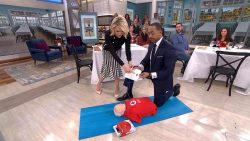 Each year, according to the American Heart Association, more than 350,000 cardiac arrests happen in the United States outside of a hospital setting. The fatality rate is nearly 90 percent because most don’t know what to do in a health emergency.
Each year, according to the American Heart Association, more than 350,000 cardiac arrests happen in the United States outside of a hospital setting. The fatality rate is nearly 90 percent because most don’t know what to do in a health emergency.
Here are the top five missteps people make when it comes to administering CPR:
- Not getting involved: “If a person collapsed in front of you and stopped moving and breathing, you want to help. The faster you jump in, the better their chances. Every second that goes by, the chance of you reversing their situation decreases. Someone should call 911 and someone should start CPR immediately,” says Dr. Sampson Davis, an emergency medicine doctor in New Jersey.
- Not calling 911 for help: “People are afraid and the gravity of the situation and the flight or fight response kicks in. Do they stay or run for the hills? They’re fearful of the moment. Not calling 911 is a mistake because you need your first responders there with medication and treatment options.”
- Giving mouth-to-mouth respiration importance over chest compression: “There are two steps. Call 911 and start chest compression right away. If someone stops breathing and has no heartbeat, there’s still enough oxygen in the bloodstream so if you help with chest compression it will help to circulate the blood. Just press away. Don’t go near their face.”
- Not knowing what you’re doing: “Your chest compressions have to be deep. Lock your elbows. Put the palm of your hand on the person’s chest in the middle. Give deep enough compressions. Go pretty fast, about 100 beats per minute. Think of your favorite song and think of that beat. Keep doing that. After a minute or two, the person may start to respond. Check for a pulse.”
- Forgetting your own safety: “In a perfect world, you have two people doing CPR, one of whom can deliver mouth-to-mouth. You just want to always be mindful. Your safety comes first. Make sure you’re not around loose wires if you’re on a job site. Be mindful of your surroundings. You hear about people who die trying to rescue someone else.”
From today.com 11/27/17

Comments are closed.